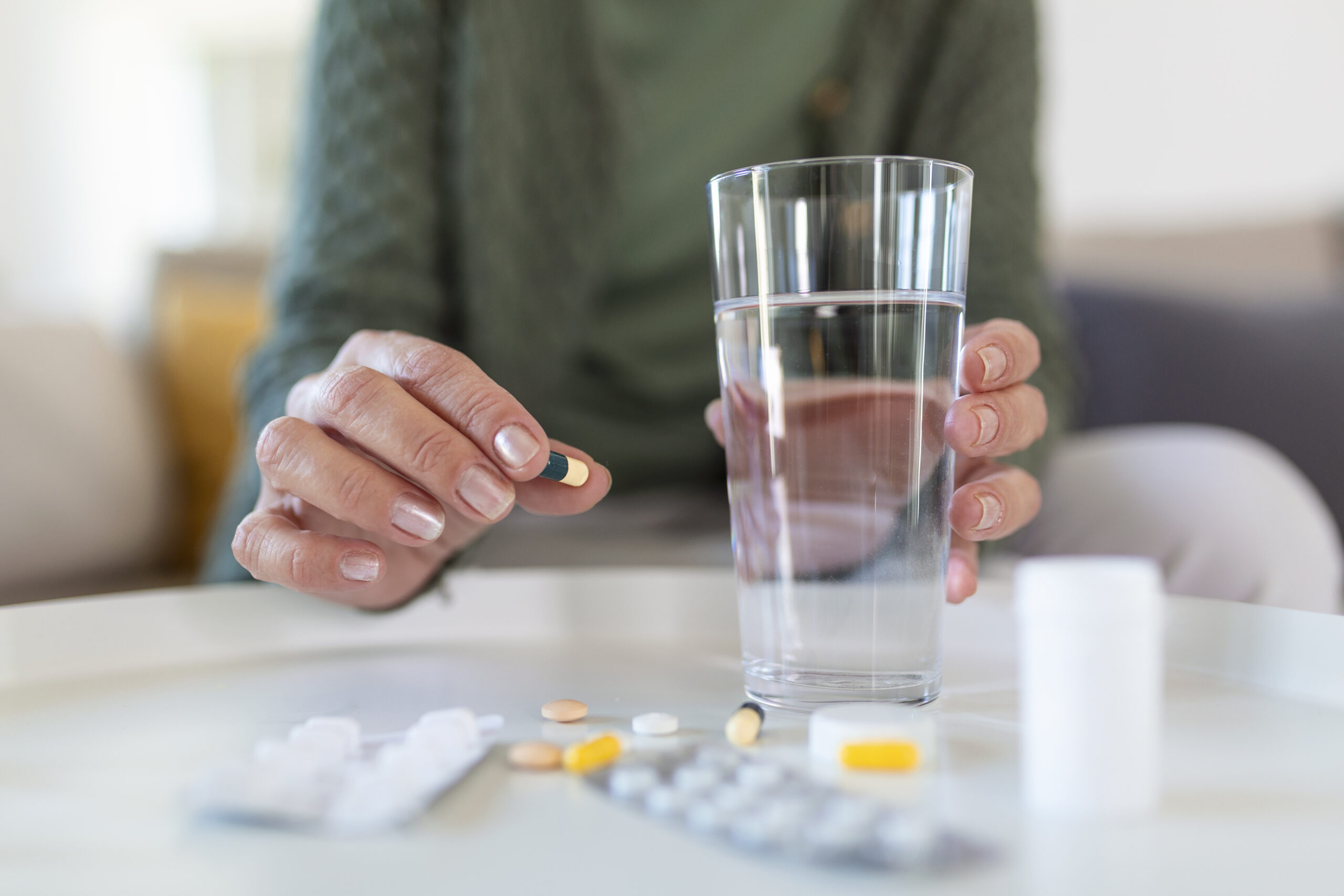Serotonin is an organic chemical substance produced due to the transformation of tryptophan to 5-hydroxytryptamine (5-HT) using appropriate enzymes. It is worth noting that tryptophan is an exogenous amino acid – the only way to obtain it is to provide this compound with food.
It has numerous meaningful roles in the human organism. It is one of the most important neurotransmitters, i.e., chemical compounds that determine the proper flow of electrical signals between individual nerve cells (neurons).
Serotonin![]() is synthesized mainly in the mucosa of the gastrointestinal tract. Its production also occurs in the central nervous system, especially in structures such as the pineal gland or raphe nuclei. Platelets in the bloodstream also contain small amounts of serotonin due to its involvement in blood clotting processes.
is synthesized mainly in the mucosa of the gastrointestinal tract. Its production also occurs in the central nervous system, especially in structures such as the pineal gland or raphe nuclei. Platelets in the bloodstream also contain small amounts of serotonin due to its involvement in blood clotting processes.
Serotonin is commonly called the hormone of happiness![]() because for many years the so-called serotonin theory of depression, which – in simple terms – assumed that a low concentration of this neurotransmitter in the brain was responsible for low mood and depression. Currently, there are scientific reports that call this theory into question. However, drug-mediated effects on serotonin are used in the treatment of many mental and neurological disorders associated with reduced serotonin concentrations in the CNS and blood, such as depressive disorders, post-traumatic stress disorder, obsessive-compulsive disorders, and anxiety disorders.
because for many years the so-called serotonin theory of depression, which – in simple terms – assumed that a low concentration of this neurotransmitter in the brain was responsible for low mood and depression. Currently, there are scientific reports that call this theory into question. However, drug-mediated effects on serotonin are used in the treatment of many mental and neurological disorders associated with reduced serotonin concentrations in the CNS and blood, such as depressive disorders, post-traumatic stress disorder, obsessive-compulsive disorders, and anxiety disorders.

Serotonin, a neurotransmitter, is synthesized![]() from the amino acid tryptophan. The process involves the hydroxylation of tryptophan to 5-hydroxytryptophan, followed by decarboxylation to form 5-hydroxytryptamine
from the amino acid tryptophan. The process involves the hydroxylation of tryptophan to 5-hydroxytryptophan, followed by decarboxylation to form 5-hydroxytryptamine![]() . While it is primarily associated with the nervous system, it is most abundant in the digestive tract and produced by intestinal chromatophilic cells. In the nervous system, serotonin synthesis occurs in the raphe nucleus of the brain stem and the pineal gland and platelets.
. While it is primarily associated with the nervous system, it is most abundant in the digestive tract and produced by intestinal chromatophilic cells. In the nervous system, serotonin synthesis occurs in the raphe nucleus of the brain stem and the pineal gland and platelets.
As previously noted, serotonin is a crucial neurotransmitter in transmitting impulses between nerve cells. However, its functions extend beyond this fundamental role. Serotonin, as a biogenic amine, is also involved in various other physiological processes![]() within the human body.
within the human body.
Serotonin secreted in the gastrointestinal tract![]() can prompt increased motility, facilitating the expulsion of ingested toxins. This mechanism is particularly significant when the body encounters harmful substances, as serotonin-induced diarrhea expedites their elimination. Moreover, this neurotransmitter is implicated in the sensation of nausea, which, if severe, may lead to vomiting, thereby aiding the expulsion of toxic agents from the body.
can prompt increased motility, facilitating the expulsion of ingested toxins. This mechanism is particularly significant when the body encounters harmful substances, as serotonin-induced diarrhea expedites their elimination. Moreover, this neurotransmitter is implicated in the sensation of nausea, which, if severe, may lead to vomiting, thereby aiding the expulsion of toxic agents from the body.
Serotonin regulates the mood![]() . When this neurotransmitter is at normal levels, individuals feel more focused, emotionally stable, joyful, and relaxed. Moreover, low serotonin levels are connected with sadness. Many medicines used to help with mood disorders (e.g., anxiety and depression) often target ways to raise the serotonin level in the brain.
. When this neurotransmitter is at normal levels, individuals feel more focused, emotionally stable, joyful, and relaxed. Moreover, low serotonin levels are connected with sadness. Many medicines used to help with mood disorders (e.g., anxiety and depression) often target ways to raise the serotonin level in the brain.
Serotonin exerts multifaceted effects on the human body, rendering its concentration a target for managing various medical conditions. In addition to the aforementioned MAO inhibitors![]() and SSRIs employed in the treatment of depression, other pharmacological agents modulate the serotonergic system. Furthermore, medications belonging to the triptan class are utilized to alleviate migraines by impacting serotonin levels and inducing vasoconstriction in the central nervous system.
and SSRIs employed in the treatment of depression, other pharmacological agents modulate the serotonergic system. Furthermore, medications belonging to the triptan class are utilized to alleviate migraines by impacting serotonin levels and inducing vasoconstriction in the central nervous system.
Serotonin deficiencies![]() in the human body result from a poorly adjusted diet and lead to serious functional disorders such as depression and insomnia. Patients have a low mood, which leads to sadness, overeating (especially sweets), lack of appetite, and even attacks of aggression. Moreover, problems with the serotonergic system are the cause of many pathological processes, which in turn are the fundamental basis of mental diseases, including schizophrenia and anxiety states.
in the human body result from a poorly adjusted diet and lead to serious functional disorders such as depression and insomnia. Patients have a low mood, which leads to sadness, overeating (especially sweets), lack of appetite, and even attacks of aggression. Moreover, problems with the serotonergic system are the cause of many pathological processes, which in turn are the fundamental basis of mental diseases, including schizophrenia and anxiety states.
In the treatment of depression caused by disorders of serotonin secretion, drugs from the group of MAO inhibitors and SSRIs are used, the main action of which is to block serotonin reuptake. Medications need to be used precisely as prescribed by a psychiatrist and under their constant management.

The condition known as serotonin syndrome![]() (SS) is a drug-induced disorder characterized by an excessive accumulation of the neurotransmitter serotonin, posing a potential threat to life. These excessive serotonin levels activate 5-HT-1A and 2A receptors within the central and peripheral nervous systems. The resulting symptoms stem from stimulating neural cells in the brain and encompass mental alterations, as well as neuromuscular and autonomic hyperactivity.
(SS) is a drug-induced disorder characterized by an excessive accumulation of the neurotransmitter serotonin, posing a potential threat to life. These excessive serotonin levels activate 5-HT-1A and 2A receptors within the central and peripheral nervous systems. The resulting symptoms stem from stimulating neural cells in the brain and encompass mental alterations, as well as neuromuscular and autonomic hyperactivity.
The primary cause is the use of psychiatric medicines that boost these neurotransmitter levels in the bloodstream. The manifestation of symptoms occurs in cases of medication overdose or as a consequence of complex drug interactions between two serotonergic medications acting through distinct mechanisms.
Symptoms vary, ranging from mild to life-threatening. In the case of mild symptoms of excess serotonin, many authors call the disease entity toxicity. The first symptoms appear 24 hours after taking the serotonergic drug. Most patients will seek help in the hospital 6 hours after side effects appear. Some people have subacute and chronic symptoms that are difficult to diagnose. Mild symptoms of high serotonin include:
A serotonin level test will be ordered if your doctor suspects a carcinoid tumor. Patients may notice:
If the patient detects the above signs, they should visit a specialist.
Other symptoms indicating disturbances in serotonin levels include mental disorders of a depressive and anxious nature. They manifest themselves, among others, in poor well-being, decreased concentration, and problems with memory and sleep. These are symptoms that should also prompt a visit to a specialist.
There are no medical contraindications associated with the administration of the test. The procedure is rapid, virtually painless, and known for its reliability, making it suitable for implementation on both children and pregnant individuals. The only circumstance that might preclude sample collection for testing is if the individual fears needle puncture.
Special preparation for the examination is unnecessary, and the patient does not need to fast. However, the physician may advise discontinuing certain medications in medically justified cases. It is important to note that any decision to discontinue treatment should be made by a specialist and not undertaken independently.
Serotonin secretion levels fluctuate throughout the day. Therefore, if the test is repeated, it should consistently be conducted at a similar time.
Serotonin level testing![]() is a routine procedure involving collecting venous blood, typically from the antecubital fossa. The patient is not required to fast before the examination; however, it is essential for them to be adequately hydrated and to have a valid referral in their possession. It may take up to 10 business days to receive the results after the test.
is a routine procedure involving collecting venous blood, typically from the antecubital fossa. The patient is not required to fast before the examination; however, it is essential for them to be adequately hydrated and to have a valid referral in their possession. It may take up to 10 business days to receive the results after the test.
The process of testing serotonin levels is generally regarded as safe, with minimal associated risks. Adverse effects are uncommon and typically include mild symptoms such as redness, bruising, or tenderness at the injection site, which are generally self-resolving and non-threatening to overall health.
In rare cases, individuals may experience weakness, dizziness, or fainting during or after the examination. In such instances, patients should remain at the collection point for a few minutes following the procedure.
To produce serotonin, the body needs to be provided with tryptophan![]() . It is a type of exogenous amino acid. This means that the human body cannot produce it on its own and that it must be consumed with food. Foods that contain high levels of tryptophan include:
. It is a type of exogenous amino acid. This means that the human body cannot produce it on its own and that it must be consumed with food. Foods that contain high levels of tryptophan include:
Physical activity is good for mental health. It won't cure mental disorders, but it promotes the release of feel-good chemicals, including endorphins and serotonin.
You can try running, swimming, cycling, dancing, jumping rope, or find another activity you enjoy. If you haven't moved much from your chair, start with cardio exercises for beginners. In this article, we described what such exercises should look like and what to pay attention to when performing them.
A few minutes spent outdoors, especially in the morning, can positively increase serotonin levels, including by stimulating the body's circadian rhythm. When we expose ourselves to the sun in the morning, our body receives a signal that it's time to start the day.
Spending time in the sun also affects the synthesis of vitamin D in the body. It plays an essential role in serotonin production![]() and activation. Unfortunately, vitamin D deficiencies are common, so supplementation of this substance is recommended.
and activation. Unfortunately, vitamin D deficiencies are common, so supplementation of this substance is recommended.
Solar radiation may have an adverse effect on our bodies, but it is worth applying protection in the form of creams with a sun filter before going out into the sun.

Insomnia and sleep problems are associated with depression and other mental disorders. It's the same spiral – depression contributes to sleep problems, and sleep problems can increase the risk of depression.
Lack of sleep disrupts the natural transmission of serotonin and instead triggers a receptor in the brain called the 5-HT2A receptor. Activation of these receptors in sleep-deprived people can mimic the symptoms of schizophrenia and, in extreme cases, cause psychosis.
Chronic stress hurts the body, including negatively affecting serotonin production and impairing serotonin receptors' functions. Implementing stress management strategies can have a positive impact on this neurotransmitter's production and function.
How to relieve stress? It is worth finding a solution that will be tailored to our capabilities. Yoga, mindfulness practice, meditation, breathing exercises, and progressive muscle relaxation soothe the organism.
Healthy social interactions encourage the brain to release serotonin, dopamine, and endorphins. Unhealthy relationships (violent, unpleasant, or forced) may lower these hormones and increase cortisol (stress hormone).
Cultivating good relationships with family and friends can improve your “social fitness” and positively impact mental health.
Preparation for serotonin is not available. However, certain medications influence the serotonergic system, which governs this neurotransmitter's behavior in the body and the response of serotonin receptors.
Medications that enhance serotonin's impact on the brain fall under serotonin reuptake inhibitors![]() (SSRIs). They are used in the treatment of various types of neurotic disorders. These are the most frequently prescribed antidepressants, which also have anti-anxiety effects. They are mainly used in:
(SSRIs). They are used in the treatment of various types of neurotic disorders. These are the most frequently prescribed antidepressants, which also have anti-anxiety effects. They are mainly used in:
The mechanism of therapeutic action of this group of drugs in depression has not been fully elucidated. Some affect the serotonergic system in the brain and selectively inhibit its reuptake. Thanks to this, they increase the concentration of this neurotransmitter in the extracellular space and enable the stimulation of postsynaptic serotonin receptors on the surface of brain cells that receive nerve impulses. As a result, an improvement in the patient's mood is observed.
SSRIs have beneficial therapeutic properties, especially in the treatment of depressive disorders. Drugs from this group are well tolerated because they rarely cause a decrease in the activity of the central nervous system (CNS). Still, on the contrary – they have an activating effect (especially in the first days of use).